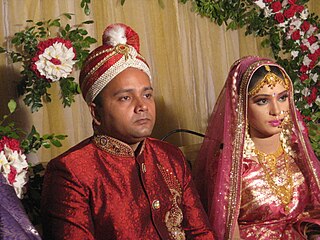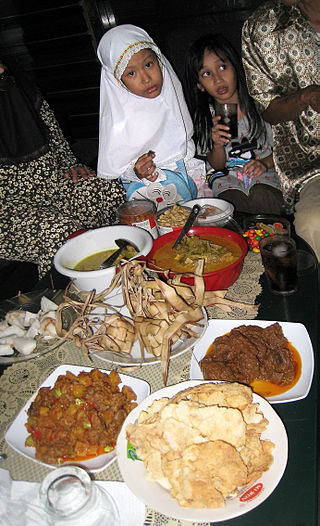
A wedding is a ceremony where two people are united in marriage. Wedding traditions and customs vary greatly between cultures, ethnicities, races, religions, denominations, countries, social classes, and sexual orientations. Most wedding ceremonies involve an exchange of marriage vows by a couple, presentation of a gift, and a public proclamation of marriage by an authority figure or celebrant. Special wedding garments are often worn, and the ceremony is sometimes followed by a wedding reception. Music, poetry, prayers, or readings from religious texts or literature are also commonly incorporated into the ceremony, as well as superstitious customs.

A wedding reception is a party usually held after the completion of a marriage ceremony as hospitality for those who have attended the wedding, hence the name reception: the couple receive society, in the form of family and friends, for the first time as a married couple. Hosts provide their choice of food and drink, although a wedding cake is popular.

An envelope is a common packaging item, usually made of thin, flat material. It is designed to contain a flat object, such as a letter or card.

A red envelope, red packet, hongbao or ang pau is a gift of money given during holidays or for special occasions such as weddings, graduations, and birthdays. It originated in China before spreading across parts of Southeast Asia and other countries with sizable ethnic Chinese populations.

Eid al-Fitr is the earlier of the two official holidays celebrated within Islam. Eid al-Fitr is celebrated by Muslims worldwide because it marks the end of the month-long dawn-to-dusk fasting of Ramadan. Eid al-Fitr falls on the first day of Shawwal in the Islamic calendar; this does not always fall on the same Gregorian day, as the start of any lunar Hijri month varies based on when the new moon is sighted by local religious authorities. The holiday is known under various other names in different languages and countries around the world. The day is also called Eid I or "Lesser Eid", or simply Eid.

The Malacca Sultanate was a Malay sultanate based in the modern-day state of Malacca, Malaysia. Conventional historical thesis marks c. 1400 as the founding year of the sultanate by King of Singapura, Parameswara, also known as Iskandar Shah, although earlier dates for its founding have been proposed. At the height of the sultanate's power in the 15th century, its capital grew into one of the most important transshipment ports of its time, with territory covering much of the Malay Peninsula, the Riau Islands and a significant portion of the northern coast of Sumatra in present-day Indonesia.

Kelantan is a state in Malaysia. The capital, Kota Bharu, includes the royal seat of Kubang Kerian. The honorific name of the state is Darul Naim. Kelantan is the only state outside of East Malaysia that does not use the term district in its second-level administrative division. Instead, the divisions are called colonies or collectivities with one autonomous subdistrict.

Islam in Malaysia is represented by the Shafi‘i school of Sunni jurisprudence. Islam was introduced to Malaysia by traders arriving from Persia, Arabia, China and the Indian subcontinent. It became firmly established in the 15th century. In the Constitution of Malaysia, Islam is granted the status of "religion of the Federation" to symbolize its importance to Malaysian society, while defining Malaysia constitutionally as a secular state. Therefore, other religions can be practiced legally, though freedom of religion is still limited in Malaysia.

Cape Malays also known as Cape Muslims or Malays, are a Muslim community or ethnic group in South Africa. They are the descendants of enslaved and free Muslims from different parts of the world, specifically Indonesia and other Asian countries, who lived at the Cape during Dutch and British rule.

The Istana Nurul Iman is the official residence of the Sultan of Brunei, Hassanal Bolkiah, and the seat of the Brunei government. The palace is located on a leafy, riverside sprawl of hills on the banks of the Brunei River, a few kilometres southwest of Bandar Seri Begawan, Brunei's capital city. The palace is often at the centre of state occasions and royal hospitality.

Islam is Brunei's official religion, 82.70 percent of the population is Muslim, mostly Sunnis of Malay, Arab and Indian origin who follow the Shafi'i school (76%) Hanafi and Maliki school (6%) of jurisprudence. Most of the other Muslim groups are Malay Kedayans, local Chinese and Dayak Iban converts. Islam was introduced to Brunei by traders arriving from Persia, Arabia, China and the Indian subcontinent. Therefore, other religions can be practiced freely.

The songkok or peci or kopiah is a cap widely worn in Brunei, Indonesia, Malaysia, Singapore, the southern Philippines, and southern Thailand, most commonly among Muslim males. It has the shape of a truncated cone, usually made of black or embroidered felt, cotton or velvet. It is also worn by males in formal occasions such as weddings and funerals or festive occasions such as the Eid ul-Fitr and Eid al-Adha holidays. In Indonesia, the peci is also associated with the nationalist movement.

Green Lane Masjid & Community Centre (GLMCC), is a mosque in Birmingham. It has been a registered charity in England since 2008. The Masjid occupies a prominent corner site in Green Lane, Small Heath, Birmingham.
A Brunei Malay wedding has many types of ceremonies.

Ibrahim bin Ali is a Malaysian politician. He is informally known as Tok Him. He served as the Member of Parliament (MP) for Pasir Mas from August 1986 to April 1995 and again from March 2008 to May 2013. He is a member of the Parti Bumiputera Perkasa Malaysia (PUTRA), a component party of the Gerakan Tanah Air (GTA) opposition coalition. He has served as the 1st and founding President of PUTRA since May 2019. He is also founding President of the Malay dominance organisation Pertubuhan Pribumi Perkasa (PERKASA).

Muslim marriage and Islamic wedding customs are traditions and practices that relate to wedding ceremonies and marriage rituals prevailing within the Muslim world. Although Islamic marriage customs and relations vary depending on country of origin and government regulations, both Muslim men and women from around the world are guided by Islamic laws and practices specified in the Quran. Islamic marital jurisprudence allows Muslim men to be married to multiple women.

Lebaran is the Indonesian popular name for two Islamic official holidays, Eid al-Fitr and Eid al-Adha in Indonesia, and is one of the major national holidays in the country. Lebaran holiday officially lasts for two days in the Indonesian calendar, although the government usually declares a few days before and after the Lebaran as a bank holiday. Many individuals or families, especially Muslims take paid time off from their workplace during these days.

Eidi, or Eidiyya, and in some cultures Eidhi, is a Middle Eastern Arab and Muslim tradition of gifting cash to children and families members by older relatives or family friends as part of the celebration of the two Muslim holidays: Eid al-Fitr and Eid al-Adha. Money is most commonly given, but other gifts are also given.
WeChat red envelope is a mobile application developed by the Chinese technology company Tencent. The concept, also offered by its market competitors Alibaba and Baidu, is based on the Chinese tradition of hongbao, where money is given to family and friends as a gift. The application was launched by Tencent in January 2014 and has subsequently gained popularity, with Tencent reporting 2.3 billion transactions on 1 January 2016 alone.


















